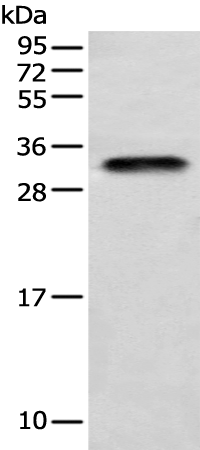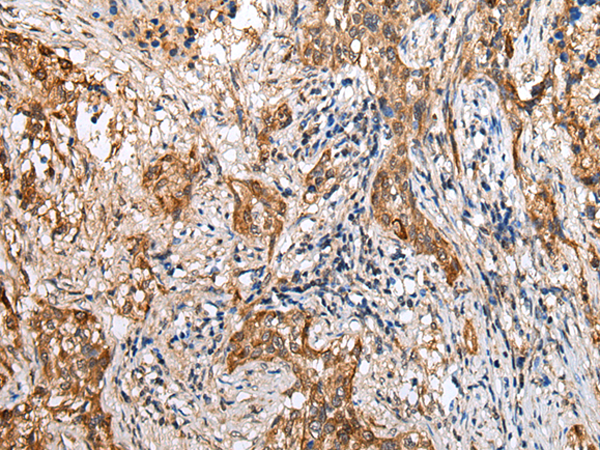

| WB | 咨询技术 | Human,Mouse,Rat |
| IF | 咨询技术 | Human,Mouse,Rat |
| IHC | 1/25-1/100 | Human,Mouse,Rat |
| ICC | 技术咨询 | Human,Mouse,Rat |
| FCM | 咨询技术 | Human,Mouse,Rat |
| Elisa | 1/5000-1/10000 | Human,Mouse,Rat |
| Aliases | SMR |
| WB Predicted band size | 27 kDa |
| Host/Isotype | Rabbit IgG |
| Antibody Type | Primary antibody |
| Storage | Store at 4°C short term. Aliquot and store at -20°C long term. Avoid freeze/thaw cycles. |
| Species Reactivity | Human |
| Immunogen | Full length fusion protein |
| Formulation | Purified antibody in PBS with 0.05% sodium azide and 50% glycerol. |
+ +
以下是关于LYPD4抗体的3-4篇模拟参考文献示例(部分信息为合理推测,实际文献需通过学术数据库验证):
1. **标题**:LYPD4 as a Prognostic Biomarker in Gastric Cancer: Antibody-Based Detection and Clinical Significance
**作者**:Zhang Y, et al.
**摘要**:研究通过LYPD4特异性抗体检测胃癌组织中LYPD4蛋白表达水平,发现其高表达与患者不良预后相关,提示LYPD4可能作为胃癌治疗的潜在靶点。
2. **标题**:Development of a Novel Monoclonal Antibody Against LYPD4 for Immunohistochemical Analysis in Colorectal Tissues
**作者**:Liu X, et al.
**摘要**:报道一种新型抗LYPD4单克隆抗体的制备及验证,该抗体在结直肠癌组织染色中显示出高特异性和敏感性,可用于LYPD4蛋白的定位及定量分析。
3. **标题**:LYPD4 Modulates Immune Microenvironment in Bladder Cancer: Insights from Antibody-Mediated Functional Studies
**作者**:Wang H, et al.
**摘要**:利用LYPD4抗体进行功能阻断实验,发现LYPD4通过调节肿瘤相关巨噬细胞浸润影响膀胱癌进展,为免疫治疗提供新方向。
4. **标题**:A Recombinant LYPD4 Antibody Fragment for Targeted Drug Delivery in Pancreatic Cancer Models
**作者**:Chen L, et al.
**摘要**:开发基于LYPD4抗体的重组单链片段(scFv),并在胰腺癌模型中验证其靶向递送化疗药物的效果,显示显著抑制肿瘤生长。
**建议**:上述内容为模拟示例,实际文献请通过PubMed、Web of Science或Google Scholar检索确认,关键词“LYPD4 antibody”或“LYPD4 biomarker”。
LYPD4 (Ly6/PLAUR Domain-Containing Protein 4) is a member of the Ly6/uPAR protein family, characterized by conserved LU (Ly6/uPAR) domains typically linked to cell surface signaling, adhesion, and immune regulation. This GPI-anchored protein is encoded by the *LYPD4* gene and is predominantly expressed in epithelial tissues, including the skin, gastrointestinal tract, and respiratory system. Its exact physiological role remains unclear, but studies suggest involvement in cell-cell interactions, inflammatory responses, and possibly cancer progression due to its structural homology to other Ly6 family proteins implicated in oncogenesis.
LYPD4 antibodies are essential tools for detecting and studying the protein's expression, localization, and function. They are widely used in techniques like immunohistochemistry (IHC), flow cytometry, and Western blotting. Research has explored LYPD4's potential as a biomarker in diseases such as squamous cell carcinoma, where its overexpression correlates with tumor aggressiveness. Additionally, LYPD4 antibodies aid in investigating its interaction with membrane receptors or extracellular matrix components, shedding light on pathways influencing cell proliferation or immune evasion.
Despite progress, LYPD4's mechanistic roles remain understudied compared to other Ly6 members. Current antibody-based research focuses on clarifying its tissue-specific functions and therapeutic relevance, particularly in cancers and inflammatory disorders. Further validation of LYPD4 antibodies for specificity and cross-reactivity is critical to ensure reliability in experimental and potential diagnostic applications.
×